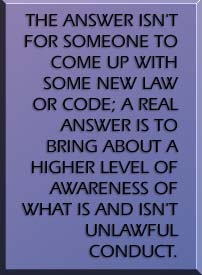



The search now became to find why this kind of conduct was going unchecked within the Internet community. Obviously, not everyone knows the details; but, clearly, many do. You wouldn’t go too long without noticing if your neighbor was running a drug smuggling ring out of his house.
Freedom contacted others who work in the field and made a few random phone calls to Internet access providers.
Each call to an access provider was made on the basis of being someone who was in the market for Internet access. Each access provider was asked what was their “selling point.”
The question was put first to Lightside Internet Services. The salesman who came on the line eagerly volunteered that there was much to be had in terms of “free” software.
"You can download just about anything else that’s out there. There’s literally thousands — hundreds of thousands — of files out there.”
On being pressed, he said he could guide subscribers to a “link to a major base site” but became general when asked what could be gotten there.
A computer expert explained that major base sites are “large, large points; large nodes in a big network.” He added that, “Pirated software may be anyplace, but it’s easier to hide in a major base site.”
They would be, for example, large sites that a major carrier like MCI or AT&T would run. He added, “You could pretty much get anything from there.”
Back to Lightside to get more specifics. When asked if he could provide DOS 6.22, the man at Lightside changed his tune. He said that was a “commercial product” and he couldn't provide it “ “Not unless Microsoft or someone else is selling it by downloading it.”
Looking into this further, Freedom found that there frequently are versions of software produced for use and distribution free of charge, known as “freeware.” Sometimes, a program would get produced in both freeware and commercial versions. But a number of these bulletin boards meant to carry only freeware programs also contain the commercial programs, often anonymously posted — shades of Alt.2600. With that in mind, the next call was to The Annex, another provider.
Again, the salesperson readily told of the virtues of signing up with them. Free software. She described some of the items that were available.
“You can download what you want” answering questions about how much all of this would cost — $38 per month for unlimited time; $10 per month for one hour a day.
When asked what was available, she said Trumpet, WinSock and “many other things.” When asked about how to obtain recent software, she replied, “We’ll put the upgrades in the libraries.”
She was then asked if one could obtain Windows ’95 — a current, popular commercial release which is being closely guarded by its publisher, Microsoft, from being pirated. Her tone changed to nervousness and said, “It’s illegal to have commercial programs.”
At Westworld Communications, the salesperson was even more blunt.
“If you want to download pirated software, it’s your own responsibility. Just about anything you want is out there.”
Of course, he is right. For the first time, it becomes clear why access providers would do nothing to change that situation or block access to the black market BBSes: for them, it is a simple matter of dollars and cents. If they can offer free software to their subscribers, they can get more subscribers and more income — all at the expense of the software producers.

 It is clear that this kind of conduct and permissiveness hurts the Net. If it isn’t changed from within, it is merely a question of time before some major crackdown results in a successful drive to regulate the Internet.
It is clear that this kind of conduct and permissiveness hurts the Net. If it isn’t changed from within, it is merely a question of time before some major crackdown results in a successful drive to regulate the Internet.
The Internet is an amazing tool with amazing potential. But the most serious threat to its continued survival today is the action — and inaction — of both those who use it and those who profit from it. Kim Willard, spokesperson for the Business Software Alliance (BSA), a Washington, D.C.-based group representing major software makers, called computer piracy the “single greatest threat to the software industry’s continued success and viability.”
Willard also told Freedom that in the United States, the piracy rate was estimated at a staggering 35 percent of total revenues, costing software manufacturers and, ultimately, the consumers, $2.8 billion. According to James Lowe, the head of Microsoft’s anti-piracy efforts in North America, his firm’s revenues would double if piracy were eradicated. And, of course, in the absence of such piracy, the firm would be in a position to make its popular software available at far lower prices.
The answer isn’t for someone to come up with some new law or code; a real answer is to bring about a higher level of awareness of what is and isn’t unlawful conduct, and see that those who act unlawfully are not allowed to just continue unhindered — but brought to justice.
For access providers themselves, who may dislike being viewed as a “judge and a jury” one of the most promising answers — virtual arbitration — began to emerge at a recent roundtable discussion on intellectual property on the Internet (See “Solutions in Cyberspace”). The Church of Scientology played a key role in bringing about that conference and pursuing workable solutions rather than more regulation.
Any freedom must be accompanied by responsibility. It is time for the industry which surrounds the Internet to accept both.

